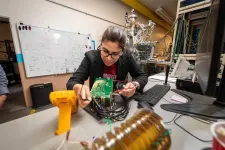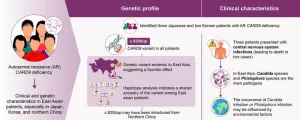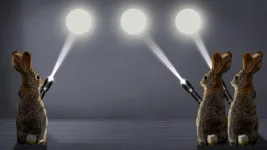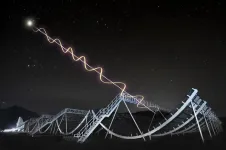Scientists unlock secrets of how the third form of life makes energy
An international scientific team has redefined our understanding of archaea, a microbial ancestor to humans from two billion years ago, by showing how they use hydrogen gas.
2024-06-11
(Press-News.org) Scientists unlock secrets of how the third form of life makes energy.
An international scientific team has redefined our understanding of archaea, a microbial ancestor to humans from two billion years ago, by showing how they use hydrogen gas.
The findings, published today in Cell, explain how these tiny lifeforms make energy by consuming and producing hydrogen. This simple but dependable strategy has allowed them to thrive in some of Earth’s most hostile environments for billions of years.
The paper, led by Monash University Biomedicine Discovery Institute scientists, including Professor Chris Greening, Professor Jill Banfield, and Dr Bob Leung, rewrites the textbook on basic biology.
Dr Bob Leung said this discovery about one of Earth’s most ancient forms of existence may also support human existence, including devising new ways to use hydrogen for a future green economy.
“Humans have only recently begun to think about using hydrogen as a source of energy, but archaea have been doing it for a billion years. Biotechnologists now have the opportunity to take inspiration from these archaea to produce hydrogen industrially.”
At the very top of the pyramid of life, there are three “domains” of life: eukaryotes (which animals, plants, and fungi fall into), bacteria, and archaea. Archaea are single-celled organisms that can live in Earth’s most extreme environments. The most widely accepted scientific theory also suggests that eukaryotes, such as humans, evolved from a very ancient lineage of archaea merging with a bacteria cell through exchanging hydrogen gas.
“Our finding brings us a step closer to understanding how this crucial process gave rise to all eukaryotes, including humans.,” Leung says
The team analysed the genomes of thousands of archaea for hydrogen-producing enzymes and then produced the enzymes in the lab to study their characteristics. They discovered that some archaea use unusual types of enzymes called [FeFe]-hydrogenases.
The archaea making these hydrogen-using enzymes were found in many of Earth’s most challenging environments, including hot springs, oil reservoirs, and deep beneath the seafloor.
These hydrogenases were thought to be restricted to only two “domains” of life: eukaryotes and bacteria. Here, the team has shown that they are present in archaea for the first time and that they are remarkably diverse in their form and function.
Not only do archaea have the smallest hydrogen-using enzymes, but they also have the most complex hydrogen-using enzymes.
The paper shows some archaea have the smallest hydrogen-producing enzymes of any life form on Earth. This could offer streamlined solutions for biological hydrogen production in industrial settings.
Professor Chris Greening said these discoveries into how archaea use hydrogen have potential applications for transitioning to a green economy.
“Industry currently uses precious chemical catalysts to use hydrogen. However, we know from nature that biological catalysts function can be highly efficient and resilient. Can we use these to improve the way that we use hydrogen?”
With ancient origins and potential applications in biotechnology, archaea continue to captivate researchers and hold promising avenues for further discovery and translation.
END
ELSE PRESS RELEASES FROM THIS DATE:
2024-06-11
The structure and function of the kidneys is altered by space flight, with galactic radiation causing permanent damage that would jeopardise any mission to Mars, according to a new study led by researchers from UCL.
The study, published in Nature Communications, is the largest analysis of kidney health in space flight to date and includes the first health dataset for commercial astronauts. It is published as part of a Nature special collection of papers on space and health.
Researchers have known that space flight causes certain health issues since the 1970s, in the ...
2024-06-11
Depressive symptoms are linked to subsequent memory decline in older people, while poorer memory is also linked to an increase in depressive symptoms later on, according to a new study led by researchers at UCL and Brighton and Sussex Medical School.
The study, published in JAMA Network Open, looked at 16 years of longitudinal data from 8,268 adults in England with an average age of 64.
The researchers concluded that depression and memory were closely interrelated, with both seeming to affect each other.
Senior author Dr Dorina Cadar, of the UCL Department of Behavioural Science & Health and Brighton and Sussex Medical School, said: “It is ...
2024-06-11
Quantum computers have the potential to solve complex problems in human health, drug discovery, and artificial intelligence millions of times faster than some of the world’s fastest supercomputers. A network of quantum computers could advance these discoveries even faster. But before that can happen, the computer industry will need a reliable way to string together billions of qubits – or quantum bits – with atomic precision.
Connecting qubits, however, has been challenging for the research community. Some methods form qubits by placing ...
2024-06-11
WASHINGTON, June 11, 2024 – Today’s intelligent robots can accurately recognize many objects through vision and touch. Tactile information, obtained through sensors, along with machine learning algorithms, enables robots to identify objects previously handled.
However, sensing is often confused when presented with objects similar in size and shape, or objects unknown to the robot. Other factors restrictive to robot perception include background noise and the same type of object with different shapes and sizes.
In Applied Physics Reviews, by AIP Publishing, researchers from Tsinghua University worked to break through the difficulties ...
2024-06-11
Researchers from Japan uncover the genetic diversity and regional patterns of CARD9 deficiency in patients susceptible to fungal diseases
Tokyo, Japan – Fungal infections pose life-threatening risks, especially when vital organs or the central nervous system are affected. Individuals harboring variants in the CARD9 gene are particularly susceptible to invasive fungal infections, given that the protein coded by this gene serves as a critical regulator of the immune system. A recent discovery ...
2024-06-11
When the COVID-19 pandemic hit, it sent shock waves across global supply chains. But manufacturers and other businesses weren’t the only ones hit hard: local and international aid organizations, tasked with providing humanitarian assistance during times of crisis, suddenly had a major crisis of their own. How would they get the supplies they needed to carry out their crucial work?
According to a new study by the UBC Sauder School of Business, the organizations showed remarkable nimbleness and ingenuity — and while the pandemic was an unusual event, their approaches can provide powerful insights ...
2024-06-11
Fukuoka, Japan—Researchers from Kyushu University have uncovered new variations to a traditional illusion, based on how we perceive the motion of flashing lights. Published on May 21 in i-Perception, the findings show that when three light flashes are presented in rapid succession in our side vision, our brain tends to perceive them in a straight line, with the second flash around the midpoint, no matter the actual location of the second flash. This research, which earned the journal’s Early Career Best Paper Prize this year, offers new perspectives on perceptual errors ...
2024-06-11
Tsukuba, Japan—Viruses are ubiquitous in the environment, and organisms have developed various mechanisms to counter their threat. However, the genome of actinomycetes contains a highly conserved gene set encoding virus-like nanoparticles, although its biological significance has remained unclear.
In this study, researchers examined Streptomyces davawensis, an actinomycete species, and discovered that it produces virus-like particles that facilitate host reproduction. Extracellular DNA, which serves as a scaffold for multicellular organization, was significantly reduced in the colonies of mutant S. davawensis strains ...
2024-06-11
TORONTO, ON, June 11, 2024 — What scientists previously thought about where Fast Radio Bursts (FRBs) come from is just the tip of the iceberg, according to new research led by astronomers at the University of Toronto. The mysteries of the millisecond-long cosmic explosions are unfolding with a new way of analyzing data from the Canadian Hydrogen Intensity Mapping Experiment (CHIME).
Published today in The Astrophysical Journal, the study details the properties of polarized light from 128 non-repeating FRBs — those from sources that have ...
2024-06-11
WASHINGTON, June 11, 2024 — Journalists who register for the fall meeting of the American Chemical Society (ACS) will have access to about 10,000 presentations on topics including agriculture and food, energy and fuels, health and medicine, sustainability, and more. ACS Fall 2024 is a hybrid meeting being held virtually and in person in Denver on Aug. 18-22, with the theme “Elevating Chemistry.”
ACS considers requests for press credentials and complimentary meeting registration from reporters (staff and freelance) and public information officers at government, nonprofit and educational institutions. Please ...
LAST 30 PRESS RELEASES:
[Press-News.org] Scientists unlock secrets of how the third form of life makes energy
An international scientific team has redefined our understanding of archaea, a microbial ancestor to humans from two billion years ago, by showing how they use hydrogen gas.




